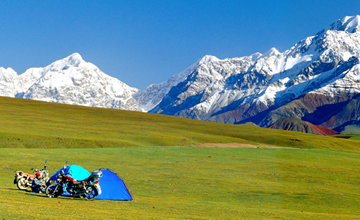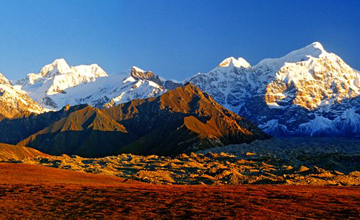Aksu Travel Guide
Aksu is a prefecture on the edge of the Taklamakan Desert in northwest China's Xinjiang Uyghur Autonomous Region; the prefecture is composed of Aksu City eight counties: Wensu, Baicheng, Kuqa, Xinhe, Xayar, Awat, Kalpin, and Wushi. Aksu, meaning "white water" in Uyghur, was the territory of the ancient kingdoms administrated by Governor-General's government for Controlling the Western Countries, such as Qiuci Gumo and Wensu. At the early Tang Times, the Anxi Governor-General Government moved to Qiuci, too, and Qiuci became military importance in Anxi. After the Liberation, the Commissioner Office was set up here.
Tarim River is the largest inland river in China; it runs 1,321 km along the rim of the barren Tarim Basin, a sparsely populated area, and formed by the confluence of the Aksu River originating in the Tianshan Mountains, the Yarkand River.
Located in the southern part of Tianshan mountain, Tomur Peak Canyon is the only place with five kinds of geological landforms.
Duolang Park is a must-see attraction in Aksu; as a traditional tribe in Southern Xinjiang, Duolang Park has displayed folk customs, houses, handicrafts, and folk museums. Meanwhile, you can also taste delicious red willow barbecue and watch Dolan Muqam.
Aksu has an excellent transportation situation, and it is the frontier point connecting the north and south of the Tianshan Mountains and opening to the west; National Highway 314 runs across the whole territory, Duku Highway connects the north and south of Tianshan Mountain. The critical passage on the ancient Silk Road in Ush County is 300 kilometers away from the Bishkek. It is the frontier connecting the north and south of the Tianshan Mountains and opening to the west.
· Aksu Wensu Airport is connected to the WuKa Expressway, which can easily reach all southern Xinjiang parts.
· It takes about 20 minutes to reach Aksu city center from the airport.
Related Articles & Posts
What to Visit in Aksu?
Aksu has a beautiful natural landscape and cultural scenery with ethnic characteristics. Here, we recommended some popular views that any foreigners traveling to Aksu are worth visiting, including Tarim River, Duolang Park, Tomur Peak Canyon, and Kizil Thousand Buddha Caves in Kuqa, etc.Tarim River is the largest inland river in China; it runs 1,321 km along the rim of the barren Tarim Basin, a sparsely populated area, and formed by the confluence of the Aksu River originating in the Tianshan Mountains, the Yarkand River.
Located in the southern part of Tianshan mountain, Tomur Peak Canyon is the only place with five kinds of geological landforms.
Duolang Park is a must-see attraction in Aksu; as a traditional tribe in Southern Xinjiang, Duolang Park has displayed folk customs, houses, handicrafts, and folk museums. Meanwhile, you can also taste delicious red willow barbecue and watch Dolan Muqam.
Qiuci Civilization and Duolang Culture:
Aksu is the intersection of Eastern and Western civilizations; among them, the ancient Silk Road culture breeds the ancient Qiuzi civilization and Duolang culture, which is slightly different from the West and the Central Plains. Its cultural features are mainly known for Buddhist grottoes, murals, music, and dance.Climate and Weather of Aksu:
Aksu has an arid climate of the temperate zone, and its annual average temperature is 7.6-11.5℃. Various landscapes via high way, railway, and air all make Aksu an attractive point to numberless tourists domestic and abroad every year.Annual Temperature of the Year/℃ ( High-Low )
| Jan. | Feb. | Mar. | Apr. | May. | Jun |
| -3/-15 | 1/-9 | 12/0 | 24/11 | 28/12 | 31/17 |
| Jul. | Aug. | Sept. | Oct. | Nov. | Dec. |
| 34/18 | 33/20 | 27/14 | 19/4 | 9/-3 | -1/-11 |
How to Get to Aksu?
Aksu has an excellent transportation situation, and it is the frontier point connecting the north and south of the Tianshan Mountains and opening to the west; National Highway 314 runs across the whole territory, Duku Highway connects the north and south of Tianshan Mountain. The critical passage on the ancient Silk Road in Ush County is 300 kilometers away from the Bishkek. It is the frontier connecting the north and south of the Tianshan Mountains and opening to the west.Go to Aksu by Air:
Aksu Wensu Airport is 12.5 kilometers north of the city center, at present, there are regular airlines to Urumqi, Xi'an, Beijing, and Zhengzhou.· Aksu Wensu Airport is connected to the WuKa Expressway, which can easily reach all southern Xinjiang parts.
· It takes about 20 minutes to reach Aksu city center from the airport.






